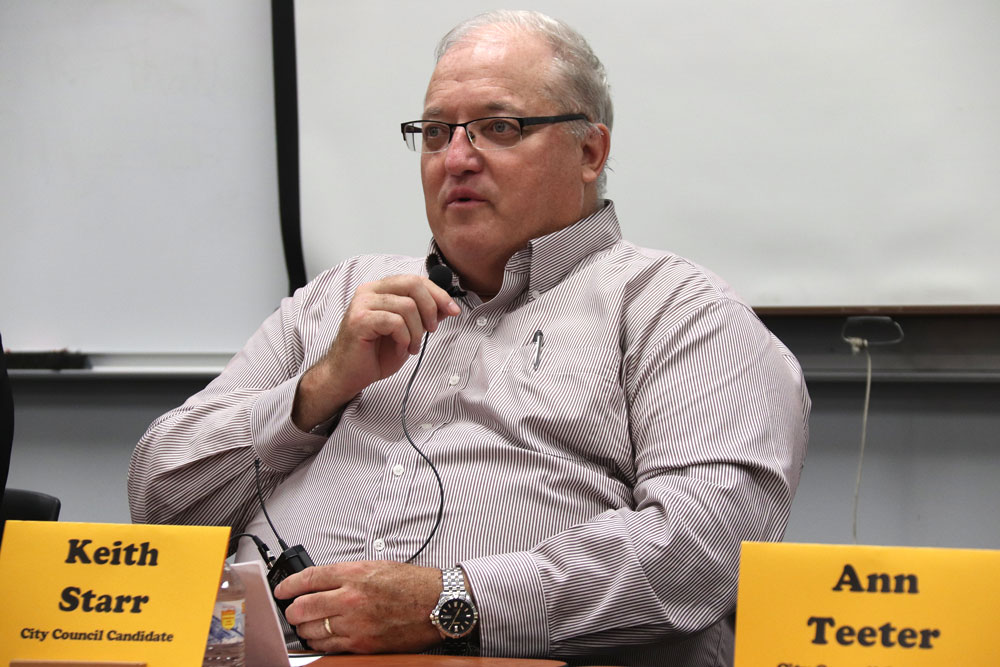You can bet on the ‘spread’ of destructive gambline
By John Burbridge sports@charlescitypress.com
I was certain I was going to win this bet, but wasn’t too upset when I lost.
A fellow Chicago Bears fan baited me to take the New England Patriots and 21 points going into Super Bowl XX. Tempting, yes, but when I successfully negotiated for 21½ points, it was a no-brainer.
In addition to a legendary defense, the Bears had plenty of swagger. And some musical talent, too. You know the “Super Bowl Shuffle” garnered more Grammy nominations than Chuck Berry and Bob Marley received during their combined careers.
But the Bears’ offense, though time-of-possession dominant, wasn’t exactly explosive. And that was one reason this bet was something I couldn’t refuse.
Mind you, I had the Patriots and 21 and a half points. If the Bears won 21-0, like they did against the NY Giants in the divisional round, I win the bet. Back then, scoring units from NFL possessions consisted of 3, 6 and 7 points. There were no 2-point conversions. So the next likely score after 21 in this format would be 24 or more. Look back at the big-win scores of that era, and you won’t see too many 22- and 23-point margins of victory.
So even if the Bears shut out the Patriots like they did to their first two playoff opponents, they would likely have to score at least 24 points — like they did against the LA Rams in the NFC Championship — for me to pay up.
In the end I did pay up as I would have even if I had been giving the Patriots and 36 points. I’ve gotten over it. Like Mike Ditka says, only cowards live in the past.
With March Madness going on, most everyone is either participating in or complicit to sport gambling. And most of this activity is illegal. (I know you must be “shocked” by this like Captain Louis Renault was about going ons within Rick’s Cafe Americain in “Casablanca”.)
NCAA bracket office pools that collect money and distribute winnings are illegal in 37 states. Iowa is among the 13 states where these pools are legal — but with a caveat. Those holding an unbusted bracket can only collect $50 maximum a day. Any amount more breaches the line, which many of these office pools often do.
That’s why I’m happy to report there are no such illicit stakes going on within the offices of the Charles City Press. Like Captain Lou, I would be “shocked” if there were.
But let’s face it, anti-gambling crusaders are likely going the way of the temperance movement and — who knows? — anti-marijuana legislation. The genie is out of the bottle with more states legalizing it in not just NCAA Tournament bracket form. There has been a counteractive push back to marginalize such newborn freedoms with restrictions to online wagering in the name of underage activity. Yet taking into account the catchphrase “There’s an App for that,” you can … umm … bet on gambling Apps dotting the touch screen on a smartphone near you.
Thus, gambling addiction may soon rival the opioid epidemic in terms of destroyed lives.
Before you go libertarian on me, let’s go back to the point spread, the most common term in the sport gambling vernacular. Like contract bridge being the card game that separates the truly skillful from the semi-lucky, point spreads are designed to reward the sport bettor who has attained greater acumen. For when it merely comes down to picking a winner, the playing field remains somewhat level for the dispassionate wagerer even when opposing the Street and Smith’s yearly subscriber.
When one anoints himself as an expert in the sport(s) he or she is betting on, knowing if a team is going to cover a spread or not is a supposed byproduct of this expertise. With the proliferation of legalized sport betting, there’s going to be a proliferation of these self-proclaimed experts.
Granted, with information and sources now at everyone’s fingertips, many will be able to get the inside track on Stephen A. Smith. But successfully utilizing point spreads will continue to become more elusive, and for this approaching new wave of upstart sport gamblers, this may become disastrous.
First, let’s look at the two frequently betted-on sports where point spreads most often come into play: basketball and football. Defenders of “old school” may disagree, but the play in both sports has greatly improved in some areas, most notably the guard play in basketball and the quarterback play in football. And this has resulted in more final scores being closer as well as wider than they should be.
Superior basketball teams may take 12-point leads into the final minute of regulation before hanging on for 2-point victories. This late tightening of the score happens more frequently in high school games — and we can only hope sports from that level can remain pristine from gambling. Anyway, the losing team will start chucking up 25-foot jumpers and — in greater frequency from year’s past — make them. Generally, you can get off a 25- to 30-foot shot on any possession if you want, but a player who does that in the first half before at least one pass is likely going to be benched no matter if he makes the bomb or not.
But kids, young adults and professionals are much better long-range shooters these days be it from camps, better coaching, and/or accessible online instruction. When given the green light at the end of the game, these shooters can suddenly put their teams back in it or at least bust the spread.
Staying ahead of the point spread in football — particularly NFL football — is also becoming more daunting. After a little dip in 2017, overall NFL offensive production continued its 40-year upward trend and seems to be picking up steam. Last season, total points per game averaged more than 47 and combined offensive yardage per game was more than 715 — by far the most ever in league history in both categories.
Close defensive duals are more susceptible to morph into blowouts with one or two quick-strike plays, which can also erase comfortable leads in games that after 57 or 58 minutes were in “Turn out the Lights” range.
The flippant dynamics that determine final margins of victory have gotten more unpredictable, and unfortunately they’re likely going to addle and bankrupt swaths from the coming windfall of legalized gamblers.
Several years ago a defrocked mayor from Lake Station, Indiana and his wife were convicted of embezzling city funds as a means to support their gambling habits. When it was revealed what type of gaming they were into, the outcry reached a crescendo. They were playing slot machines for Pedro’s sake!
If you’re going to gamble with tax payers’ money, don’t feed it to a slot machine. They are designed to pay the house first and more, and the intermittent winner second and less. The only surefire way to finish ahead playing slots is to hit a jackpot and walk away never to return.
Lower percentages of gamblers are going to come out ahead wagering on point spreads in sports as the math become more chaotic. You can only hope they’ll eventually walk away before becoming victims of a “victimless” leisure and more legalized activity.









Social Share